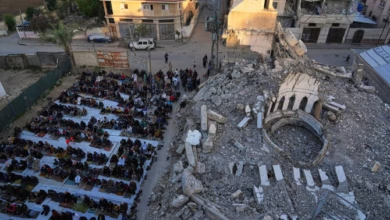
The United States has pledged to continue its military strikes against the Houthi rebels in Yemen until they halt their attacks on global shipping. This comes amid escalating tensions, with the Houthi group vowing to intensify their attacks in response to American airstrikes.
In recent operations, the U.S. military launched airstrikes targeting Houthi-controlled sites in Yemen, with the latest strikes occurring early Monday morning. According to Houthi-run Al-Masirah TV, the U.S. targeted a cotton factory in the Zubayd district of Al Hudaydah province on Yemen’s western coast, which had previously been struck by Israeli airstrikes in 2024.
U.S. Strikes and Houthi Retaliation
U.S. Defense Secretary Pete Hegseth stated that American forces will persist with their military actions until the Houthi attacks on maritime shipping cease. Meanwhile, Houthi spokesperson Yahya Saree announced that the group would respond to U.S. actions with further escalation, specifically claiming that they had targeted the U.S. aircraft carrier USS Truman for a second time in 24 hours.
However, U.S. officials reported that American warplanes successfully intercepted 11 Houthi drones on Sunday, with none of them coming near the USS Truman. A senior U.S. official also confirmed the detection of a missile off the coast of Yemen, although it was not deemed a direct threat.
Rising Casualties and Intensified Military Engagements
The ongoing airstrikes represent one of the largest U.S. military operations in the Middle East since President Donald Trump took office in January. According to the Ministry of Health in Houthi-controlled areas, at least 53 people have been killed in the strikes. U.S. officials suggest that the operation may continue for several more weeks.
Secretary of State Marco Rubio, in an interview with CBS News, reinforced that U.S. strikes on Yemen would persist until the Houthis’ ability to threaten global shipping and U.S. military vessels was neutralized.
Meanwhile, Moscow has urged Washington to de-escalate, with Russian Foreign Minister Sergey Lavrov contacting Rubio to stress the importance of immediate ceasefire efforts and political dialogue. In response, President Trump warned Iran to cease its support for the Houthis, while Iranian officials pledged to retaliate if the U.S. follows through on its threat to hold Tehran accountable for the Houthis’ actions in Yemen.
Broader Regional and Global Reactions
The situation in Yemen has drawn global attention, with United Nations Secretary-General António Guterres calling for “maximum restraint” and warning of further escalation in Yemen. He urged all parties to halt military activities and return to dialogue to avoid a broader conflict.
The United States has also faced criticism from Iran, with Iranian Foreign Minister Abbas Araghchi asserting that it is not Washington’s place to dictate Iran’s foreign policy. Iranian officials, including General Hossein Salami of the Islamic Revolutionary Guard Corps (IRGC), have vowed to retaliate against any U.S. military action targeting Iran.
Impact on Global Trade Routes
The Houthi attacks on shipping routes have severely impacted global trade, particularly in the Red Sea and the Bab al-Mandab Strait, which together handle around 12% of the world’s shipping traffic. These strategic maritime routes have become increasingly disrupted, causing shipping companies to seek more expensive alternative routes.
Since October 2023, following the escalation of the Israel-Hamas conflict in Gaza, the Houthis have launched numerous drone and missile attacks on commercial ships passing through these waters, citing solidarity with Palestinians as their motivation. This has further strained global supply chains and contributed to rising shipping and insurance costs.
Conclusion: A Tense Stand-off with Global Ramifications
The situation in Yemen continues to evolve, with both U.S. and Houthi forces showing no signs of backing down. As the conflict intensifies, the broader implications for international trade and regional security remain uncertain. The United States and its allies face growing challenges in maintaining the security of vital shipping lanes, while the Houthis, backed by Iran, continue to press for greater influence in the region.
The coming weeks will be crucial in determining whether diplomacy can de-escalate the situation or if the ongoing military exchanges will spiral into a broader regional conflict. Global observers will be watching closely as the United States and its partners navigate this complex and volatile situation.
This article is based on recent developments and reports regarding the ongoing conflict between the U.S. and the Houthi movement in Yemen. For continuous updates and in-depth analysis, stay tuned to MorningIslam.com
SUBSCRIBE
NO SPAM – JUST NEWS THAT MATTERS.








